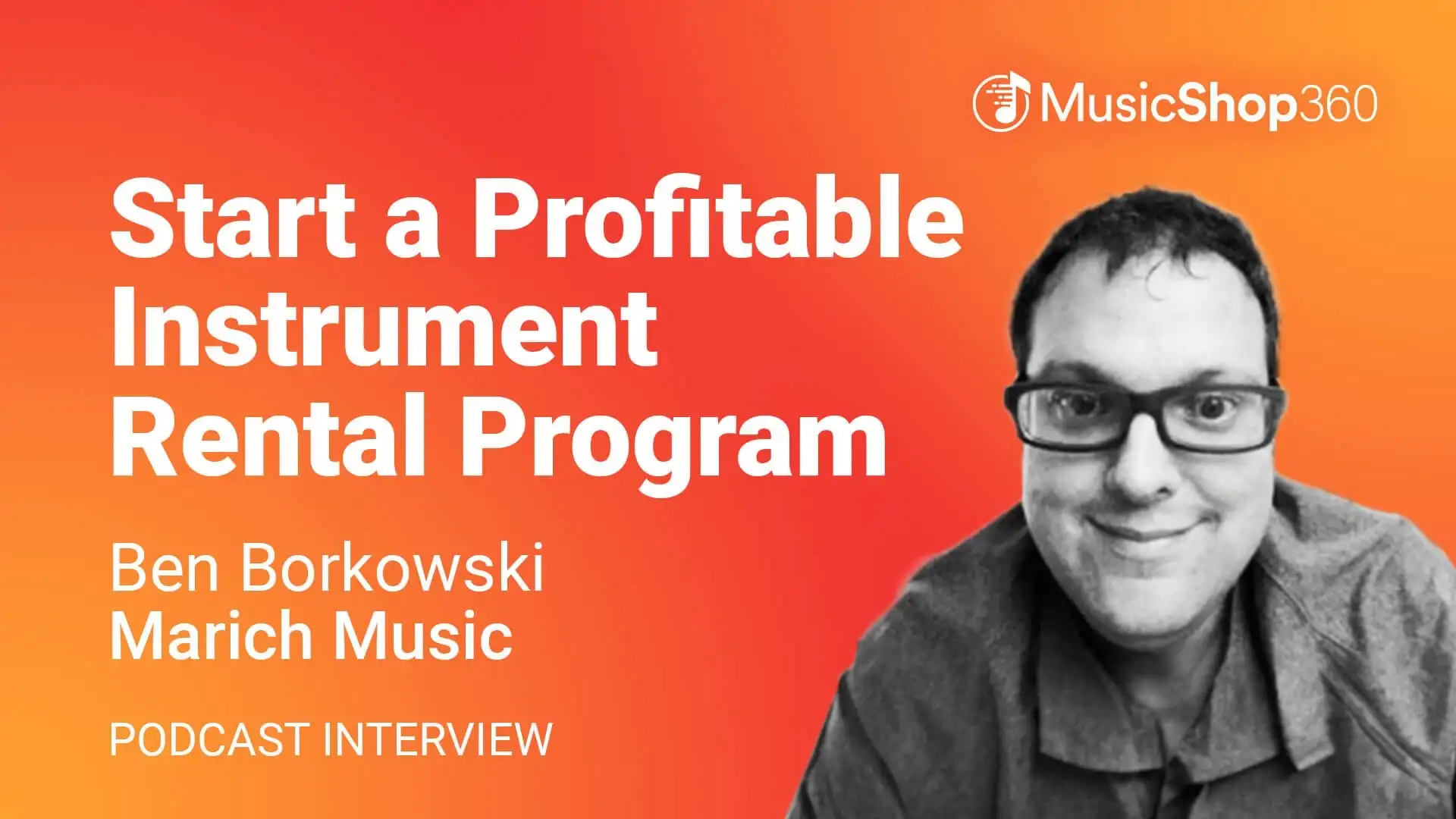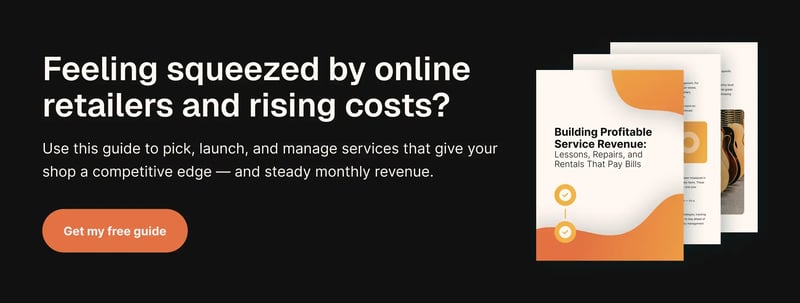
Running a small music store isn’t for the faint of heart. Between thin margins, changing customer habits, and rising costs, even veteran shop owners are finding it harder than ever to stay profitable.
For Ben Borkowski, a music store owner in New York, the challenge nearly broke him.
The pandemic shut down in-person traffic. Inflation made inventory more expensive. And the retail side of the business barely covered expenses anymore.
Ben credits his instrument rental program with keeping the business afloat through tough times and rising costs. Along with lessons and repairs, rentals have completely changed the trajectory of his store.
Instead of closing the doors, he found a way to rebuild, automate, and grow.
This is his story — and why his lessons can help any small music store owner who’s trying to figure out what’s next.
How To Start an Instrument Rental Program in 6 Easy Steps
1. Recognize Why Retail Sales Aren’t Enough Anymore
Let’s be blunt — the days of retail sales carrying a music store are over.
Margins are shrinking. Competition from big-box stores and online giants makes it impossible to compete on price. Even when a customer comes in and buys an instrument, the profit is often so slim that it doesn’t cover the overhead of running a brick-and-mortar shop.
Ben knows this better than anyone. At his store, retail sales are essentially break-even, and the real revenue comes from rentals, lessons, and repairs — the true lifeblood of the business.
If you’re a music store owner still trying to live off retail, that statement might hit hard. But it’s also freeing. Retail isn’t where the money is — so it’s time to focus your energy on what is working.
Related Read: How To Start a Musical Instrument Rental Business: 8 Steps
2. See How an Instrument Rental Program Pays Off
One of the biggest misconceptions Ben hears is that rentals aren’t worth the investment. Some owners see the upfront cost of buying instruments and think the math never works out.
But Ben tracked the numbers closely, and his data tells a very different story:
- Year one is the hardest: Cash flow feels tight until your instruments are nearly paid off.
- Year two is better: You’ve covered most of your costs, and cash flow starts improving.
- Year three is great: By this point, most of your instruments are generating profit every month.
- Year four is the maximum profit cycle: The instruments have long since been paid off, and the recurring rental payments keep coming in.
In Ben’s experience, instruments pay for themselves in 10–11 months, then become pure profit.
If you’re renting out quality instruments, they often don’t even need major service in the first couple of years. Ben charges a $5 monthly maintenance fee, which adds up to $60 a year. That fee covers basic upkeep until the instrument is fully paid off.
3. Automate Your Instrument Rental Program
One reason Ben’s rental program runs so smoothly is his commitment to automation.
His philosophy is simple: “Anything that does not generate direct revenue that can be done by a robot… has to go.”
This approach has shaped how he manages his entire shop.
Here are some of the ways he uses automation:
- Lessons: What was once handled by a coordinator is now fully automated with online booking and credit card autopay.
- Rentals: Parents sign up digitally instead of filling out paper contracts.
- Admin: Receipts, inventory tracking, and serial number management are all taken care of automatically through the shop’s point of sale (POS) system.
Automation saves time, freeing Ben and his small staff to focus on what really grows the business: building relationships with teachers, serving customers, and keeping instruments in top shape.
4. Use QR Codes To Simplify School Rental Nights
If you’ve ever worked a school rental night, you know the pain — parents in long lines, staff juggling stacks of contracts, and teachers trying to keep everyone patient.
That’s how many competitors still operate.
But Ben rebuilt the process with technology. Instead of pushing paper, he gives parents a short pitch and a simple QR code.
Parents scan it with their phone, fill out the rental agreement digitally, and instantly receive everything they need:
- Terms and conditions
- Serial numbers
- Rental receipt
They can then choose whether to:
- Pick up the instrument in-store.
- Have it delivered to the school.
- Get it dropped off at home.
The process takes just minutes. Parents are relieved, teachers are grateful, and customers walk away impressed with the convenience.
5. Strengthen School Relationships
Ben’s competitors have dedicated road reps who visit schools, but his small staff doesn’t allow for that.
Here’s how he leans into personal connection instead:
- He gives every band director his personal cell number.
- He makes pickups and dropoffs himself.
- He focuses on reducing teacher workload.
This personal touch, combined with an efficient rental system, has helped his store compete successfully against larger chains.
An instrument rental program is about creating a relationship that lasts long after the initial contract.
6. Grow Long-Term Value From Every Instrument Rental
When a student rents their first trumpet, flute, or violin from your store, you’re beginning a journey with that family. Over time, that relationship can lead to:
- Sales of accessories and method books
- Repair work and adjustments
- Lessons that keep the student progressing
- Step-up instrument sales as they improve
Ben sees rentals as the gateway to lifelong customers. The smoother the process, the more likely families are to stick with your store for years to come.
Related Read: How To Manage Musical Instrument Rentals: 9 Tips & Tools
Apply This Instrument Rental Program Playbook to Your Music Store
If you’re a small music store owner trying to navigate today’s challenges, Ben’s story offers a practical playbook for survival and growth:
- Don’t depend on retail: It’s break-even at best.
- Invest in an instrument rental program: Even if the upfront cost feels scary, the 10- to 11-month break-even point proves it works.
- Automate wherever possible: Free your staff to focus on revenue-generating tasks.
- Prioritize relationships: Teachers and parents value reliability and simplicity over paperwork.
- Think long-term: Rentals are the start of a customer relationship that leads to lessons, repairs, and upgrades.
Power Your Rental Program With Music Shop 360
If Ben’s playbook feels like the future of your store, Music Shop 360 is the platform built to run it.
With Music Shop 360, you can:
- Set up autopay and recurring billing with card-on-file so you can stop chasing monthly payments.
- Offer easy sign-ups with mobile-friendly online rentals, email and SMS receipts, and flexible pickup, delivery, or ship-to-school options.
- Track every instrument with serialized inventory, multilocation visibility, and easy transfers.
- Turn renters into loyal customers with repair work orders, lesson integration, e-commerce tools, and built-in marketing and loyalty programs.
- See everything in one place with simple reports on rentals, lessons, sales, and service.
Ready to see it in action? Schedule a demo today.




 by
by 






